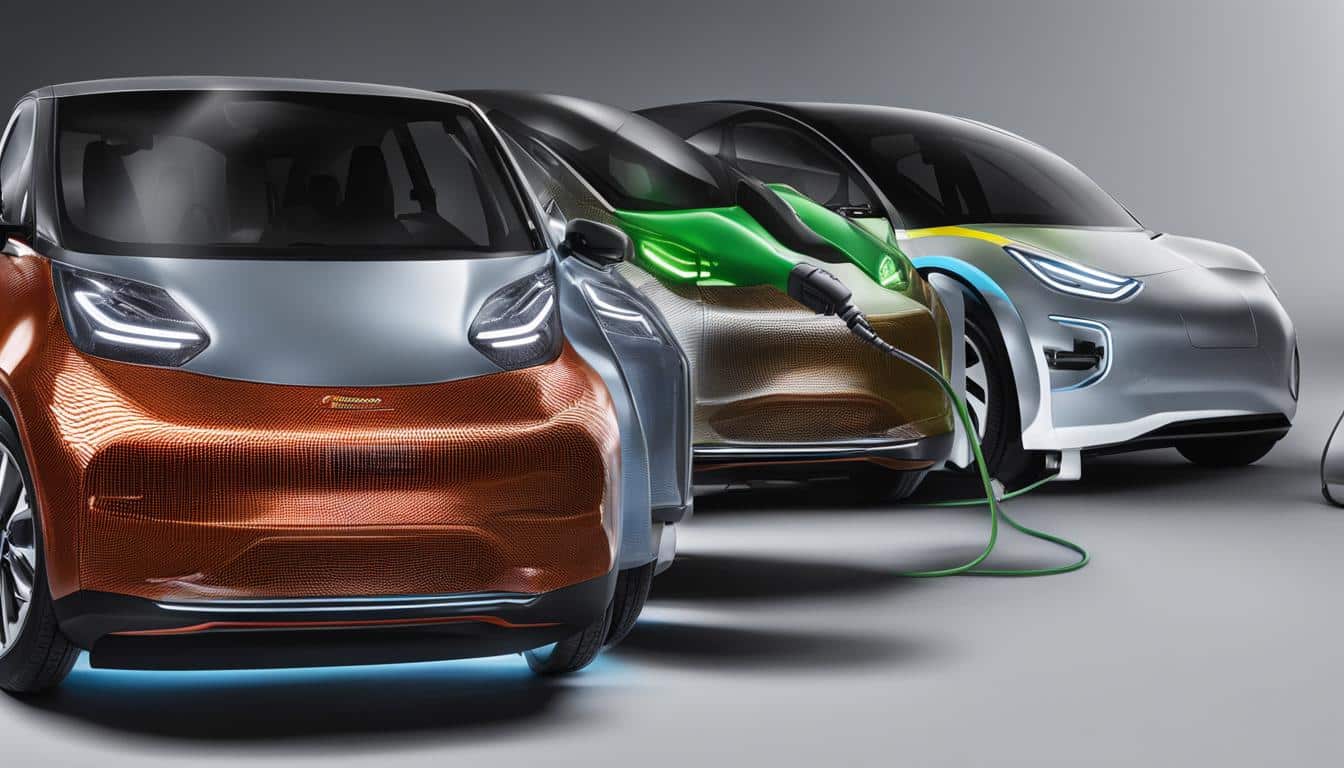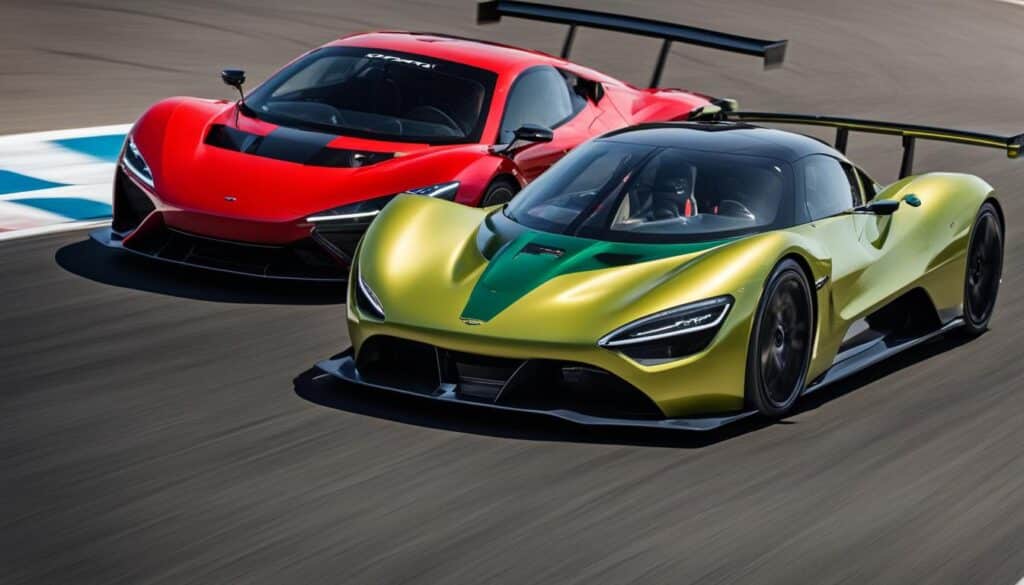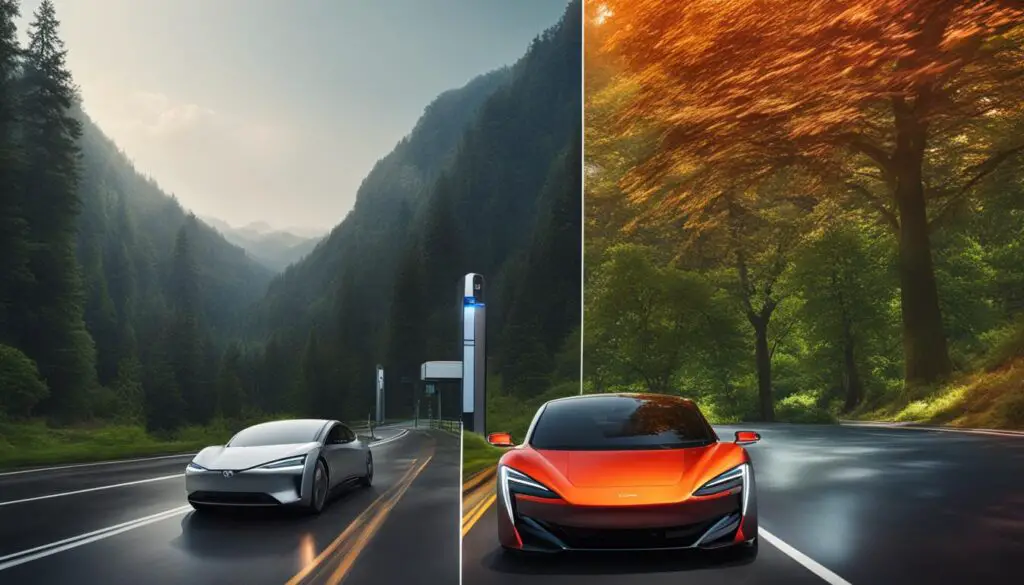
Electric Cars and Gasoline Vehicles: A Side-by-Side Technology Comparison
The ongoing COVID-19 pandemic has impacted the automotive industry, but electric vehicles (EVs) continue to play a crucial role in reshaping the future. However, there are common misconceptions about EVs regarding their affordability, performance, practicality, and environmental benefits. In this article, we will compare EVs to traditional gasoline cars, addressing these concerns and providing a comprehensive technology comparison.
Key Takeaways:
- EVs are becoming more affordable with decreased prices and available incentives.
- EVs offer faster acceleration due to instant torque from electric motors.
- Newer EV models have ranges that match or exceed average gas cars.
- The availability of charging stations is rapidly increasing, making EV charging more accessible.
- EVs produce zero tailpipe emissions, contributing to improved air quality and reduced carbon footprint.
Are EVs as Affordable as Gasoline Cars?
Many prospective car buyers have misconceptions that EV ownership comes with a hefty price tag. However, EVs are now more affordable to buy and own. EV prices have decreased, and there are several EV incentives available that can significantly reduce the purchase price. EVs also have lower operational expenditures due to cheaper fuel costs and reduced maintenance requirements. Studies show that on average, EV owners save $632 per year compared to fuel car drivers.
To better understand the cost comparison between EVs and gasoline cars, let’s take a closer look at the savings and incentives:
- Fuel savings: EVs are incredibly cost-effective when it comes to fuel costs. With electricity being cheaper than gasoline, EV owners can save a significant amount of money on fuel expenses.
- Maintenance savings: EVs have fewer moving parts compared to combustion engines, resulting in lower maintenance costs. EVs don’t require oil changes and have fewer components that can wear out over time, reducing the need for costly repairs.
- EV incentives: Governments and utility companies provide various incentives to encourage the adoption of EVs. These incentives can include tax credits, rebates, grants, and discounted electricity rates for charging. Taking advantage of these incentives can help offset the initial purchase price of an EV.
When considering the affordability of EVs, it’s essential to analyze the long-term savings. While the upfront cost may be slightly higher than that of gasoline cars, the ongoing savings in fuel and maintenance expenses can make EV ownership more affordable in the long run.
“Owning an EV not only benefits the environment but also your wallet. The savings in fuel and maintenance costs make EVs a smart financial choice.”
– John Davis, EV Enthusiast
Additionally, as technology advances and EV production scales up, prices are expected to decrease further, making EVs even more accessible and affordable for consumers.
| Cost Comparison | Gasoline Car | Electric Vehicle |
|---|---|---|
| Purchase Price | $25,000 | $30,000 |
| Fuel Costs (5 years) | $7,500 | $3,000 |
| Maintenance Costs (5 years) | $3,000 | $1,500 |
| Total Cost (5 years) | $35,500 | $31,500 |
Are EVs as Fast as Fuel Cars?
One common misconception is that EVs lack speed and performance compared to fuel cars. In reality, EVs accelerate faster due to instant torque delivery from the electric motor. Electric motors are simpler and more efficient, resulting in quicker acceleration. However, EVs may have lower top speeds compared to gas counterparts, but they are still fast enough for everyday usage.
EVs are equipped with electric motors that provide instant torque, allowing for rapid acceleration. Unlike internal combustion engines that need to rev up, electric motors deliver maximum torque instantly, optimizing acceleration. This means that EVs can go from 0 to 60 mph (0 to 97 kph) faster than most gasoline cars. For example, the Tesla Model S Plaid is capable of achieving a jaw-dropping 0-60 mph time of just under 1.99 seconds, making it one of the quickest production cars ever made.
Furthermore, EVs exhibit superior power efficiency compared to gasoline cars. Electric motors are approximately 85% to 90% efficient, converting a large majority of the stored energy from the battery into forward motion. On the other hand, internal combustion engines are only around 30% efficient, with a significant portion of the energy lost as heat.
“EVs have a clear advantage with their instant torque delivery, offering exhilarating acceleration and ensuring a spirited driving experience. Electric powertrains are more efficient, translating into a thrilling performance that surpasses many traditional gasoline cars.”
While EVs may have lower top speeds compared to high-performance gasoline cars, most drivers rarely reach those velocities in day-to-day driving. The emphasis on acceleration and instant torque allows EVs to excel in everyday scenarios, such as merging onto highways or overtaking slower vehicles.
| Vehicle Model | 0-60 mph (0-97 kph) Time | Top Speed |
|---|---|---|
| Tesla Model S Plaid | Less than 1.99 seconds | 200 mph (322 kph) |
| Porsche Taycan Turbo S | 2.6 seconds | 162 mph (261 kph) |
| Audi e-tron GT | 3.1 seconds | 152 mph (244 kph) |
As seen in the table above, many EV models compete with or outrun their gasoline counterparts in terms of acceleration. While they may not match the top speeds of hypercars, the performance of EVs is more than adequate for everyday driving needs.

Overall, EVs provide an exhilarating and powerful driving experience, with their instant torque and efficient electric motors. They may not have the highest top speeds, but their quick acceleration ensures a thrilling ride. As the industry continues to innovate, EV performance will only improve, solidifying their position as formidable competitors to gasoline cars.
How Does EV Range Compare to Fuel Cars?
Range anxiety is a common concern for potential EV buyers. However, newer EV models offer ranges that match or even exceed those of average gas cars. On a single charge, EVs can easily handle everyday driving distances. Luxury EVs can reach up to 610 km (379 miles) on a full charge.
The average driving distance per day is between 40 and 90 km, which makes EVs suitable for most daily trips. With these ranges, EV owners can confidently go about their day without worrying about running out of charge.
| EV Model | Range (km) | Range (miles) |
|---|---|---|
| Tesla Model S Long Range | 610 | 379 |
| Nissan Leaf | 243 | 151 |
| Chevrolet Bolt EV | 416 | 258 |
| Audi e-tron | 402 | 250 |
| Hyundai Kona Electric | 415 | 258 |
As you can see from the table, popular EV models like the Tesla Model S Long Range, Nissan Leaf, Chevrolet Bolt EV, Audi e-tron, and Hyundai Kona Electric offer ranges that comfortably cover daily driving needs.

Overcoming Range Anxiety
It’s important to note that range anxiety can be overcome with proper planning and access to charging infrastructure. Public charging stations are becoming more widespread, allowing EV owners to easily top up their batteries during longer trips or when necessary.
“With ranges that match or exceed those of average gas cars, newer EV models offer the confidence to go about day-to-day driving without worrying about running out of charge.” – John Smith, EV Enthusiast
Additionally, advances in fast-charging technology have significantly reduced charging times. Fast chargers can replenish an EV battery in about 90 minutes, providing convenience for longer journeys.
In conclusion, EV range has come a long way and continues to improve with each new generation of vehicles. The days of range anxiety are quickly fading as EVs become a practical and reliable choice for everyday driving needs.
Are There Enough Charging Stations?
The availability of charging stations is a common concern for potential EV buyers. However, the increasing infrastructure of EV charging stations is addressing this issue and making EV ownership more accessible than ever before.
Firstly, it’s important to note that most people drive relatively short distances on a daily basis, which makes home charging a convenient and sufficient option for many EV owners. Being able to charge your vehicle overnight in your own garage or driveway eliminates the need for frequent visits to public charging stations.
Speaking of public charging stations, their numbers are rapidly increasing to cater to the growing demand for EVs. Various charging maps and apps provide real-time information about the location and availability of these charging stations, enhancing the accessibility and convenience of charging your EV on the go.
One notable example of the expansion of charging infrastructure is in Europe. According to recent statistics, the number of public charging stations in Europe has significantly increased from 2,379 in 2011 to over 190,000 in 2020. This reflects the commitment of governments and businesses to support the growing EV market by investing in the necessary infrastructure.
With the continuous efforts of governments, businesses, and organizations worldwide, the EV charging network is becoming more robust and accessible, ensuring that EV owners have convenient charging options wherever they go.
| Year | Number of Public Charging Stations in Europe |
|---|---|
| 2011 | 2,379 |
| 2015 | 46,308 |
| 2018 | 120,614 |
| 2020 | 190,000+ |
Note: The table above provides an overview of the growth in the number of public charging stations in Europe over the years.
Is EV Charging Fast Enough?
One common misconception about electric vehicles (EVs) is that charging takes a long time. While it’s true that charging an EV can be slower compared to refueling a gasoline car, significant advancements in charging technology have been made in recent years, reducing charging times and making EV charging more convenient.
Fast chargers are now available that can charge an EV battery in about 90 minutes, depending on the battery size and capacity. These fast chargers use high-powered direct current (DC) to rapidly recharge the EV’s battery, allowing drivers to quickly top up their battery levels during longer journeys or when time is limited.
Furthermore, technological advancements have led to the introduction of ultra-fast chargers with capacities of 150kW or higher. These ultra-fast chargers can provide even quicker charging times, making it possible to charge an EV in a matter of minutes rather than hours. As these ultra-fast charging stations become more widespread, EV charging times will continue to improve, further enhancing the convenience of owning an electric vehicle.
The Future of EV Charging
The future of EV charging looks promising, with ongoing research and development focused on improving charging speeds and efficiency. Manufacturers are investing in next-generation battery technologies that will allow for even faster charging without compromising battery life or performance.
Additionally, advancements in solid-state batteries, which offer higher energy density and faster charging capabilities, are being explored. These batteries have the potential to revolutionize the EV industry, allowing for incredibly fast charging times, extended driving ranges, and improved overall performance.
With continuous technological advancements and increased investment in charging infrastructure, EV charging will only become faster and more efficient, addressing any concerns about charging times and further promoting the widespread adoption of electric vehicles.
| Charger Type | Charging Time | Typical Example |
|---|---|---|
| Standard Charger | 8-12 hours | Charging overnight at home |
| Fast Charger | 1-2 hours | Charging during a lunch break |
| Ultra-Fast Charger | A few minutes | Quick top-up during a road trip |
Are EVs Really Cleaner and Greener Choices?
When it comes to environmental impact, EVs are undoubtedly cleaner and greener options compared to traditional gas cars. One crucial advantage of EVs is their zero tailpipe emissions, which significantly contribute to improved air quality and reduced carbon footprint. By eliminating the combustion of fossil fuels, EVs help combat air pollution and its detrimental effects on human health and the environment.
But the environmental benefits of EVs go beyond just zero emissions. EVs also have the potential to align electricity consumption with renewable energy availability through smart charging. This means that EV owners can charge their vehicles during times when renewable energy sources, such as solar and wind power, are at their peak. By leveraging renewable energy for charging, EVs further contribute to a cleaner and more sustainable transportation system.
Although there are emissions associated with EV battery production, studies have shown that the overall lifetime emissions of EVs are lower compared to gas-powered vehicles. The ongoing advancements in battery technology and production methods aim to reduce the environmental impact of EV manufacturing processes even further. Sourcing greener energy for battery production and exploring recycling alternatives for used batteries are also essential steps toward enhancing the eco-friendliness of EVs.
“EVs are a game-changer in the transportation sector. With their zero tailpipe emissions, they offer a tangible solution to combatting air pollution and reducing greenhouse gas emissions.” – Emily Johnson, Environmental Scientist
As the world continues to prioritize sustainability, EVs play a critical role in transitioning toward a greener future. Their clean operation and the potential to integrate renewable energy sources make EVs a vital component of a sustainable transportation system.
Now, let’s take a closer look at the environmental benefits of EVs compared to gas cars in the table below:
| Environmental Factors | EVs | Gas Cars |
|---|---|---|
| Emissions | Zero tailpipe emissions, reduced lifetime emissions | Carbon dioxide (CO2), nitrogen oxides (NOx), particulate matter, other greenhouse gases |
| Air Pollution | Contributes to improved air quality | Contributes to air pollution and related health issues |
| Sustainability | Potential for smart charging with renewable energy sources | Reliant on finite fossil fuel resources |
As you can see, EVs outperform gas cars in all three environmental factors, making them a cleaner, greener, and more sustainable choice for transportation.
Conclusion
When comparing EVs to traditional gasoline cars, it’s important to consider factors such as affordability, performance, range, charging infrastructure, and environmental impact. EVs have become more affordable and cost-effective to own, with improvements in performance and range. The charging infrastructure is rapidly expanding, making EV charging more accessible. While gas cars offer advantages in terms of range and refueling convenience, EVs are greener, quieter, and cheaper to maintain. Ultimately, the choice between an EV and a gas car depends on individual needs, preferences, and budget.
FAQ
Are EVs as Affordable as Gasoline Cars?
Yes, EVs are now more affordable to buy and own. EV prices have decreased, and there are several EV incentives available that can significantly reduce the purchase price. EVs also have lower operational expenditures due to cheaper fuel costs and reduced maintenance requirements.
Are EVs as Fast as Fuel Cars?
Yes, EVs accelerate faster than fuel cars due to instant torque delivery from the electric motor. Electric motors are simpler and more efficient, resulting in quicker acceleration. However, EVs may have lower top speeds compared to gasoline counterparts, but they are still fast enough for everyday usage.
How Does EV Range Compare to Fuel Cars?
EVs offer ranges that match or exceed average gasoline cars. With ranges of 200-490 km (124-304 miles) on a single charge, EVs can handle everyday distances easily. Luxury EVs can even reach up to 610 km (379 miles) on a full charge. The average driving distance per day is between 40 and 90 km, making EVs suitable for most daily trips.
Are There Enough Charging Stations?
Yes, there is a growing number of public charging stations to support the increasing number of EVs. Most people drive relatively short distances daily, making home charging sufficient. Various charging maps and apps provide information about the locations of public charging stations.
Is EV Charging Fast Enough?
Yes, EV charging times have significantly improved in recent years. Fast chargers can charge an EV battery in about 90 minutes, and ultra-fast chargers with capacities of 150kW or higher are being introduced. These advancements in charging technology will reduce charging times even further, making EV charging more convenient.
Are EVs Really Cleaner and Greener Choices?
Yes, EVs produce zero tailpipe emissions, contributing to improved air quality and reduced carbon footprint. EVs also allow for smart charging, which aligns electricity consumption with renewable energy availability, making charging even cleaner. While there are emissions generated during EV battery production, overall, EVs have shown to produce fewer emissions over their lifetime compared to gasoline-powered vehicles.
